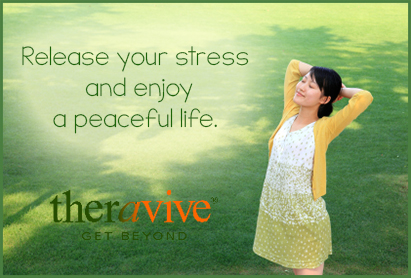The title of this article is actually a quote from Lama Surya Das in his book, Awakening the Buddha Within (1997). I was so stuck by the simple wisdom of this statement that I posted it on my computer at work, and my refrigerator at home, as a frequent reminder of the dangers of hanging on to things that are better let go. But letting go of feelings, people or situations that are destructive to us, or out of our control, is easier said than done. We hold on and attach for lots of different reasons, but learning to let go and detach in healthy ways can help restore our sense of peace and our relationships with others.
[More]
Our personal lives and our work lives can be filled with tense moments, conflict, and competing demands. Life also delivers ups and downs in the form of job losses, cheating spouses, major illnesses, and death. Being able to manage these difficult times effectively requires skills that anyone can learn. Not only is being unflappable an admirable and beneficial quality in times of crisis, it can also be good for your mental health.
[More]
How often can you say that you are fully present in the moment? It’s a hard question to answer, especially if you haven’t asked what that actually means. The ability to be in the moment involves attention and presence to experience a moment with all its fullness. That is, your mind, your body, and all your senses are focused in that moment.
[More]
June 23, 2014
by Christie Hunter

Due to the increasing competition in every field, the percentage of people suffering from depressive disorders or chronic stress has increased dramatically over the past few years. There is no denying the fact that it is not possible to completely avoid stress, but there are a number of ways through which the impact of stress can be reduced. By re-evaluating the ways of chaos management, people can avoid stressful situations or learn to handle such situations strategically (Amstadter at al., 2009).
[More]
October 29, 2013
by Casey Truffo, LMFT

Forgiveness isn't easy but holding grudges and clinging to past hurt only makes matters worse. Learn why it's so important to let go and move forward, for ourselves AND those who are important to us.
[More]
Of course, we all do! So why does it allude most of us?
Because we have to work at it in
[More]
August 5, 2013
by Cindy Marie Hosszu

We are wired...
These days, we don’t often find ourselves running from mountain lions on our way to hunt for dinner, but our bodies are still wired to protect us from threats. Some more common threats we face in our time is mounting bills, busy jobs, raising teenagers, or… the amount of caffeine we put in our body. Caffeine increases cortisol levels in the body at rest, and exaggerates stress. [1] Cortisol is a stress hormone that functions to manage blood pressure, control blood sugar, and immune response. Cortisol is released in response to fear or stress by the adrenal glands, and is what we know as the fight or flight response. The same fight or flight response that was released when faced with a predator before computers, and other machines or gadgets existed to bring us a new kind of stress in our lives.
While we may not think of them as a threat, our bodies deal with stress the same way it would deal with the threat of running from mountain lions. When faced with a perceived threat, the hypothalamus, in the brain, initiates a process in which the body releases signals that alert your adrenal glands to release a surge of hormones. One of the hormones is adrenaline which increases your heart rate, blood pressure, and energy. Another hormone is Cortisol, which increases glucose in the bloodstream to trigger your brain to use glucose efficiently, and repair tissues. Cortisol also represses the immune system, digestive system and reproductive system, as well as the growth process. This process also controls mood, motivation, and fear.[2] After the threat has been removed, the hormones naturally flow back to a normal state of balance.
That cup of coffee in the morning gives us that boost of cortisol that we need to feel energy, and get our body moving. When we feel the crash that comes after, we often follow up with another cup of coffee, raising our cortisol again. We think it ends there, but research has found that the effects don’t just last for the day; they also last into the evening. [3] If this is a daily ritual for us, we may be putting ourselves at risk of adrenal stress. What happens in the body when the fight or flight response is activated without the action of fight or flight, is that the level does not flow back to natural state of balance properly. That constant flow of cortisol will increase the stress and eventually make it harder to manage stress.
Symptoms of Stress
Symptoms of adrenal stress will not show up overnight, but will happen slowly and gradually. Some of the symptoms are fatigue, depression, trouble sleeping, dizziness, muscle weakness and back pain, recurring infections, headaches, inflammation, salt craving, memory problems, hyperpigmentation, and excessive thirst.[4]
The Effects of Stress
Elevated cortisol levels can cause weight gain, increase in cholesterol, heart disease, and can lower bone density, as well as immune functions. It can also interfere with learning and memory. Long term increases in cortisol can cause damage to the brain and impair mental function. It is associated with cell death, which is associated with increased depression, mood, and nervous system disorders. If cortisol levels fluctuation too often, it can cause depression and mental illness. The executive function which is responsible for decision-making, planning, and reasoning are compromised.
Tips for Stress
Because caffeine exaggerates stress, it is best to not use any amount of caffeine during times of high stress such as physical exertion, emotional stress, grieving or illness.
To initiate the final step in the response get aerobic exercise regularly for about 30 minutes. You can do something that lets your aggression out, such as punching bag, or kick boxing.
Reduce anxiety by using meditation, or other relaxation techniques:
Get plenty of sleep.
Laughter and music helps reduce anxiety.
Have healthy relationships.
Seek professional counseling when needed.
[1] William R. Lovallo, Noha H. Farag, Andrea S. Vincent, Terrie L. Thomas, Michael F. Wilson, Cortisol responses to mental stress, exercise, and meals following caffeine intake in men and women, Pharmacology Biochemistry and Behavior, Volume 83, Issue 3, March 2006, Pages 441-447, ISSN 0091-3057
[2] "Chronic stress puts your health at risk - MayoClinic.com." Mayo Clinic. N.p., n.d. Web. 27 July 2013.
[3] "Caffeine Affects Cardiovascular and Neuroendocrine Activation at Work and Home." Psychosomatic Medicine. Journal of Behavioral Medicine, n.d. Web. 25 July 2013.
[4] Wilson, James L. Adrenal Fatigue: The 21st Century Stress Syndrome. Petaluma, CA: Smart Publications, 2001. 27-45. Print.
Am I the only one who stays up late all week doing things around the house, forcing myself to go to sleep so that I can get up for work the next day, in full anticipation of Friday when I can stay up late to party, or in my case, read that book that left me hanging in the last chapter? Then, when Friday finally rolls around, I find myself falling asleep at the dinner table. It is so unfair. But isn’t that what being a good parent, spouse, employee, friend, etc. is all about? We do everything we can to keep all those proverbial plates balanced high above our heads on that tiny stick so that we have happiness all around us. The problem with that is that my family knows I’m “there” physically, but my brain is in bed dreaming up my own ending to that book that I’m dying to finish. So, who benefits from my exhaustion?
We’ve heard about the studies that show how stress makes us less productive at work, how power-naps are great for productivity, and delegating tasks will free up time and allow more productive time on the job. Well, let’s apply this to all aspects of our lives. The take-away from all that corporate stuff is simple. Reduce stress, get sleep, and ask for help. But how on earth do we apply that to our busy family lives?
Get Your Priorities Straight
The first thing we have to realize is that we must have time to ourselves in order to be healthy for those around us. I know it is a lot easier said than done, but we have to sort through what really matters. The chores are always there, but our kids will grow up, and have their own time management system one day. Define what is most important to you, and start there. If it is 30 minutes during the day to take a walk, or read a book, do it! Schedule it.
Teach The Kids About “Me Time”
Good habits start young. One way to teach kids about “Me time” and still have some, is to give the whole household that time at the same time. Use different parts of the house to have each person do one thing for a specified amount of time that they like to do on their own. I can do my reading, while my son does his drawing. Uninterrupted bliss, I say. If that doesn’t work, try alternating child date nights between spouse and the grandparents. While the kids are having fun with your spouse, you can get spa time, and then be rejuvenated enough to enjoy the kids on your special day with them. The kids will have a memory of special time with each parent, and you each get some well-deserved solitude.
Plan Time To Plan
Who has time to sit down and write what you’re thinking, right? No, this is really important. Not only do we organize our thoughts, but it has a way of helping us commit. Plan your meals to save the infamous, “What would you like for dinner” with the “I don’t care” response. Put a menu where everyone in the house can see it. Of course, that also requires the shopping plan too. Shop once a week so that you have one less worry in your week, and it saves money too.
Eat Raw
Yes, I know how much kids love their veggies, but saving time can be good for them. Salad nights are great dinners, and it saves you from cooking. On grocery day, wash and cut all the produce, and keep it at child level in the refrigerator. In addition to making healthy snacks available to the kids, it allows you to organize your refrigerator, and the best part is that it makes it easy for kids to help make that salad for dinner. If it is all washed and cut, all you need to do is dish it up. Kids can do that.
Enlist The entire Family in Chores
It is time we start acknowledging how smart and capable our kids are, and give them the chance to feel a part of the household. Even young children can be a big help, and let’s face it, they love to get praise for a job well done. Make a game for the little ones and teach them about seeing things that need to be done. If they see a stray shoe, they can put it in its home. They can shoot some hoops by tossing that sock in the laundry basket. In order to help the little ones learn good habits and teach them routines, place lists where they can see them. Morning routines or even chores can be put on a sticky note for them to do something on their own. An excited “Thank you so much for helping” will keep them looking at those notes daily.
White Board
The one tool I could not live without is my dry erase board. We each put everything on the board. The menu, shopping list, appointments, lists of things that need to be done, and anything else we may forget, or that other family members may need to know. Placed in a central location, where everyone sees it daily, it also lets everyone know how they can help, in addition to knowing when you are not available. I use different colors for different sorts of tasks, but get creative, and let the kids help. White boards are so much fun for kids.
Set Time Limits
For those big jobs, set a timer and do as much as you can for just 10 minutes a day. It is amazing what you can get done 10 minutes at a time.
Whatever you do, get started. Don’t put it off. Life is way too short to look forward to that fun thing you get to do at the end of the week, only to be too exhausted to participate.
The origins of Thanksgiving have nothing to do with a bunch of Indians and pilgrims sitting down for a bountiful feast of turkey. In reality although the settlers with pale faces had been bothering the Indians in addition to giving them many new diseases they had never had were starving by this time. The Indians took pity on them and brought them some corn and fish. Thanksgiving has a lot of emotional disappointment and this article will show you how to deal with this.
This is a period of time in which you are expected to give to others and be generous. Although the intention is good it often leads to self sacrifice and disappointment. This is a period of time in which you must balance your newfound humanitarianism with the demands on your own life. If you do not continue to reach your own immediate goals either at work or at home you will find yourself being irritable and exhausted. Remember that an obligation to give to others does not mean that you have to sacrifice your own needs. You must remember to give yourself some time for your own physical and mental well-being. It is a time when we most often neglect the things we do to make ourselves happy and keep ourselves balanced like exercise, yoga, or other spiritual practices for your own physical and mental well-being This is a time to find some positive solutions to deal with your family members past resentments. Remember that when I family system gets back together it quickly returns to whatever difficulties encountered before. Even if you're the only person in the room aware of this it may help you from dealing with the fallacy that "now that we're all together we must be alright."
This leads to the need to decide on your priorities and organize your time adequately. I this will counteract your feelings that you have not a planned enough for Thanksgiving. If you find additional time you can always volunteer to feed the poor would do random acts of kindness. You may also need to have planned out some unstructured inexpensive holiday activity because this holiday evokes a feeling of being served good food rather than organizing fun things to participate in. Spending some time thinking about this will save the day when you are reunited with your family and no one knows what to do.
One of the major fallacies are that Thanksgiving will take away feelings of loneliness, sadness, fear, anger and frustration. This holiday is heavily advertised is a time in which everyone appreciates being together. The fallacy behind that becomes clear when you are reuniting with family members and you realize why you have become independent of them. You may find yourself being overwhelmed with anger or fear or worse yet feeling alone being surrounded by your family. The worst emotion that creeps up on this holiday is resentment. It is usually triggered by a previous bad relationship with a family member. Beware of grudges and slights you have suffered in the past and keep them from resurfacing.
Thanksgiving is designed to encourage gluttony. This is not an open invitation to eat too much. Remember that most people with eating disorders simply want to have something to control in their lives and to avoid the resentment and self-hatred you will naturally feel after eating way past feeling hungry. This includes other over indulgences. You know by now what you need to keep a careful eye on so that you don't lose control and this may be an opportunity to set an example with other family members who still have raging addictions. You may want to have some contingency plans when they become abusively angry, drunk or chemically impaired.
If it the end of the holiday feast you find yourself still feeling depressed or resentful remember what the Indians did. They didn't like these foreigners who is strange customs and behaviors showed such a resentment towards nature that it disrupted and destroyed the Indian culture. Yet they still took pity on these poor starving people and threw them a fish or two.